本文來源電子發燒友社區,作者:李先生, 帖子地址:https://bbs.elecfans.com/jishu_2284399_1_1.html
前言
獲取代碼
添加代碼
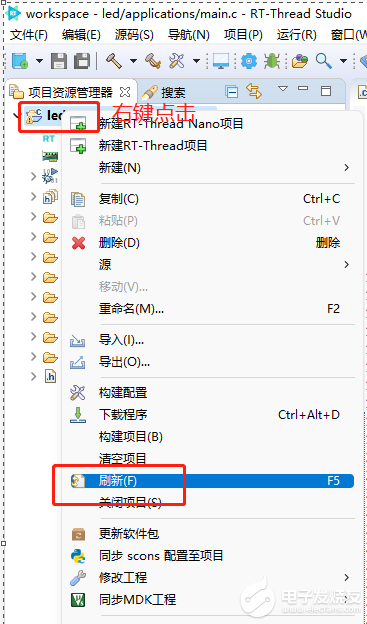
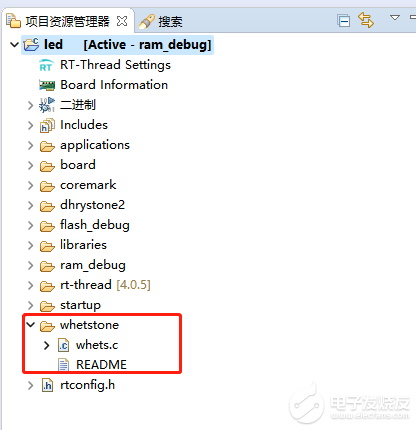
修改代碼
測試
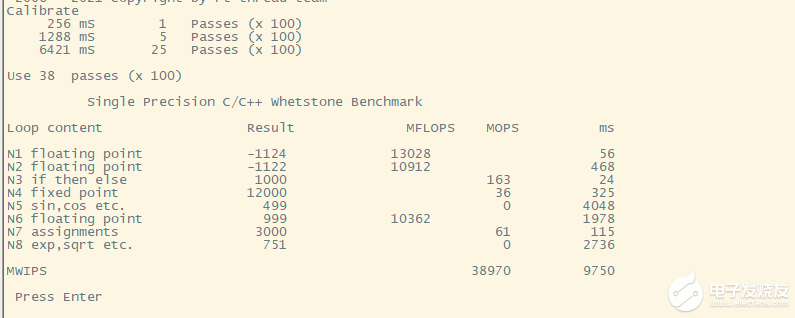
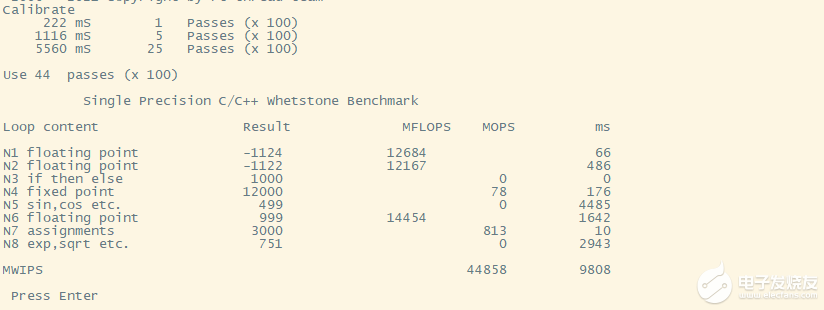
對比
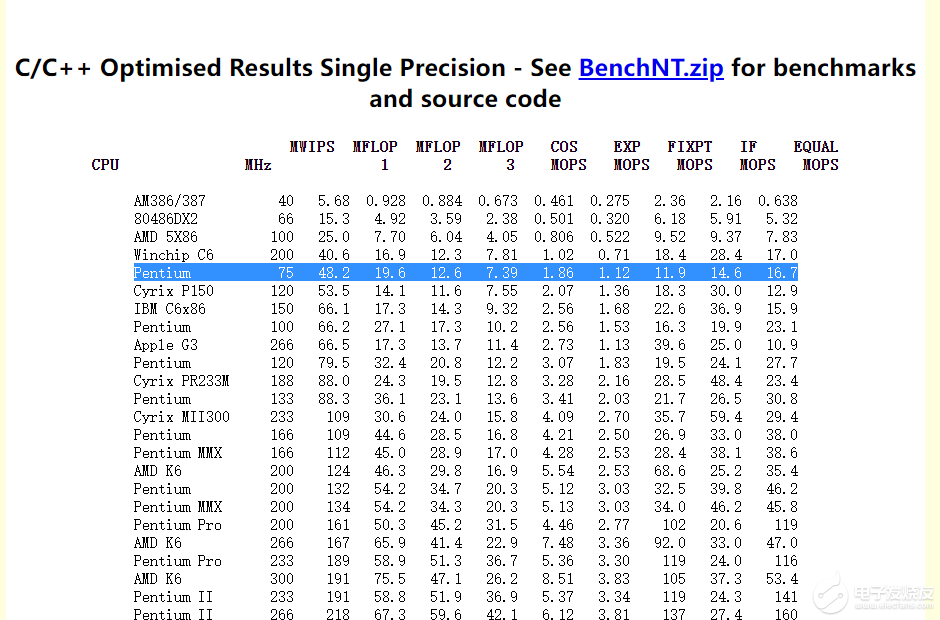
復制代碼
前言
之前我們使用dhrystone和coremark進行了相關的性能測試。這次我們使用whetstone進行測試,該測試關注浮點相關的計算性能。
獲取代碼
http://www.roylongbottom.org.uk/classic_benchmarks.tar.gz
下下載classic_benchmarks.tar.gz文件
解壓文件
將classic_benchmarksclassic_benchmarkssource_codewhetstone復制到工程目錄
projled下
按照上一步將文件復制到工程目錄下后,按照如下方式刷新

可以看到源碼添加到了工程目錄

修改代碼
前面注釋**************************************************************************少了/
注釋掉#include"cpuidh.h"
注釋掉getDetails
刪除whets.txt相關操作
fprintf改為rt_kprintf
Main改為whetstone_main
pout調用時字符串中刪除
浮點數都放大100倍整數打印
詳見后面附錄代碼
在main中調用
intcore_main(intargc,char*argv[]);
whetstone_main(0, 0);
注以下結果放大100倍,整數打印
-O0

-O3

|
RT_tiCK_PER_SECOND=1000
|
||||
|
優化等級0
|
優化等級3
|
|||
|
RAM中運行
|
MWIPS
|
38.970
|
44.858
|
|
|
ROM中運行
|
||||
對比
可以從下網站看看打敗了全國多少網友
http://www.roylongbottom.org.uk/whetstone%20results.htm

附whets.c代碼
- /*gcc whets.c cpuidc64.o cpuida64.o -m64 -lrt -lc -lm -o whet
- *
- *Document: Whets.c
- *File Group: Classic Benchmarks
- *Creation Date: 6 November 1996
- *Revision Date: 6 November 2010 Ubuntu Version for PCs
- *
- *Title: Whetstone Benchmark in C/C++
- *Keywords: WHETSTONE BENCHMARK PERFORMANCE MIPS
- * MWIPS MFLOPS
- *
- *Abstract: C or C++ version of Whetstone one of the
- * Classic Numeric Benchmarks with example
- * results on P3 to P6 based PCs.
- *
- *Contributor: roy@roylongbottom.org.uk
- *
- ************************************************************
- *
- * C/C++ Whetstone Benchmark Single or Double Precision
- *
- * Original concept Brian Wichmann NPL 1960's
- * Original author Harold CurnowCCTA 1972
- * Self timing versions Roy Longbottom CCTA 1978/87
- * Optimisation control Bangor University 1987/90
- * C/C++ Version Roy Longbottom 1996
- * Compatibility & timersAl Aburto 1996
- *
- ************************************************************
- *
- * Official version approved by:
- *
- * Harold Curnow100421.1615@compuserve.com
- *
- * Happy 25th birthday Whetstone, 21 November 1997
- *
- ************************************************************
- *
- * The program normally runs for about 100 seconds
- * (adjustable in main - variable duration). This time
- * is necessary because of poor PC clock resolution.
- * The original concept included such things as a given
- * number of subroutine calls and divides which may be
- * changed by optimisation. For comparison purposes the
- * compiler and level of optimisation should be identified.
- *
- * This version is set to run for 10 seconds using high
- * resolution timer.
- *
- ************************************************************
- *
- * The original benchmark had a single variable I which
- * controlled the running time. Constants with values up
- * to 899 were multiplied by I to control the number
- * passes for each loop. It was found that large values
- * of I could overflow index registers so an extra outer
- * loop with a second variable J was added.
- *
- * Self timing versions were produced during the early
- * days. The 1978 changes supplied timings of individual
- * loops and these were used later to produce MFLOPS and
- * MOPS ratings.
- *
- * 1987 changes converted the benchmark to Fortran 77
- * standards and removed redundant IF statements and
- * loops to leave the 8 active loops N1 to N8. Procedure
- * P3 was changed to use global variables to avoid over-
- * optimisation with the first two statements changed from
- * X1=X and Y1=Y to X=Y and Y=Z. A self time calibrating
- * version for PCs was also produced, the facility being
- * incorporated in this version.
- *
- * This version has changes to avoid worse than expected
- * speed ratings, due to underflow, and facilities to show
- * that consistent numeric output is produced with varying
- * optimisation levels or versions in different languages.
- *
- * Some of the procedures produce ever decreasing numbers.
- * To avoid problems, variables T and T1 have been changed
- * from 0.499975 and 0.50025 to 0.49999975 and 0.50000025.
- *
- * Each section now has its own double loop. Inner loops
- * are run 100 times the loop constants. Calibration
- * determines the number of outer loop passes. The
- * numeric results produced in the main output are for
- * one pass on the outer loop. As underflow problems were
- * still likely on a processor 100 times faster than a 100
- * MHz Pentium, three sections have T=1.0-T inserted in the
- * outer loop to avoid the problem. The two loops avoid
- * index register overflows.
- *
- * The first section is run ten times longer than required
- * for accuracy in calculating MFLOPS. This time is divided
- * by ten for inclusion in the MWIPS calculations.
- *
- * Early version has facilities for typing in details of
- * the particular run, appended to file whets.txt along
- * with the results. This version attemps to obtain these
- * automatically.
- *
- * 2010 Section 4 modified slightly to avoid over optimisation
- * by GCC compiler
- *
- * Roy Longbottomroy@roylongbottom.org.uk
- *
- ************************************************************
- *
- * Whetstone benchmark results, further details of the
- * benchmarks and history are available from:
- *
- * http://www.roylongbottom.org.uk/whetstone%20results.htm
- * http://www.roylongbottom.org.uk/whetstone.htm
- *
- ************************************************************
- *
- * Source code is available in C/C++, Fortran, Basic and
- * Visual Basic in the same format as this version. Pre-
- * compiled versions for PCs are also available via C++.
- * These comprise optimised and non-optimised versions
- * for DOS, Windows and NT. See:
- *
- * http://www.roylongbottom.org.uk/whetstone%20results.htm
- *
- ************************************************************
- *
- * Example of initial calibration display (Pentium 100 MHz)
- *
- * Single Precision C/C++ Whetstone Benchmark
- *
- * Calibrate
- * 0.17 Seconds 1 Passes (x 100)
- * 0.77 Seconds 5 Passes (x 100)
- * 3.70 Seconds 25 Passes (x 100)
- *
- * Use 676passes (x 100)
- *
- * 676 passes are used for an approximate duration of 100
- * seconds, providing an initial estimate of a speed rating
- * of 67.6 MWIPS.
- *
- * This is followed by the table of results as below.
- * Whetstone SinglePrecision Benchmark in C/C++
- *
- * Loop content Result MFLOPS MOPS Seconds
- *
- * N1 floating point -1.12475025653839100 19.971 0.274
- * N2 floating point -1.12274754047393800 11.822 3.240
- * N3 if then else 1.00000000000000000 11.659 2.530
- * N4 fixed point 12.00000000000000000 13.962 6.430
- * N5 sin,cos etc. 0.49904659390449520 2.097 11.310
- * N6 floating point 0.99999988079071040 3.360 45.750
- * N7 assignments 3.00000000000000000 2.415 21.810
- * N8 exp,sqrt etc. 0.75110864639282230 1.206 8.790
- *
- * MWIPS 28.462 100.134
- *
- *Note different numeric results to single precision. Slight variations
- *are normal with different compilers and sometimes optimisation levels.
- *
- **************************************************************************/
- #include /* for sin, exp etc. */
- #include /* standard I/O */
- #include /* for strcpy - 3 occurrences*/
- #include /* for exit - 1 occurrence */
- //#include "cpuidh.h"
- /*PRECISION PRECISION PRECISION PRECISION PRECISION PRECISION PRECISION*/
- /* #define DP */
- #ifdef DP
- #define SPDP double
- #define Precision "Double"
- #else
- #define SPDP float
- #define Precision "Single"
- #endif
- //#define opt "Opt 3 64 Bit"
- void whetstones(long xtra, long x100, int calibrate);
- void pa(SPDP e[4], SPDP t, SPDP t2);
- void po(SPDP e1[4], long j, long k, long l);
- void p3(SPDP *x, SPDP *y, SPDP *z, SPDP t, SPDP t1, SPDP t2);
- void pout(char* title, float ops, int type, SPDP checknum,
- SPDP time, int calibrate, int section);
- static SPDP loop_time[9];
- static SPDP loop_mops[9];
- static SPDP loop_mflops[9];
- static SPDP TimeUsed;
- static SPDP mwips;
- static char headings[9][18];
- static SPDP Check;
- static SPDP results[9];
- #include "rtthread.h"
- doubletheseSecs = 0.0;
- doublestartSecs = 0.0;
- doublesecs;
- int millisecs = 0;
- void start_time()
- {
- startSecs = rt_tick_get()*1.0/RT_TICK_PER_SECOND;
- return;
- }
- void end_time()
- {
- secs = rt_tick_get()*1.0/RT_TICK_PER_SECOND - startSecs;
- millisecs = (int)(1000.0 * secs);
- return;
- }
- int whetstone_main(int argc, char *argv[])
- {
- int count = 10, calibrate = 1;
- long xtra = 1;
- int section;
- long x100 = 100;
- int duration = 10;
- ///FILE *outfile;
- char compiler[80], options[256], general[10][80] = {" "};
- char endit[80];
- int i;
- int nopause = 1;
- if (argc > 1)
- {
- switch (argv[1][0])
- {
- case 'N':
- nopause = 0;
- break;
- case 'n':
- nopause = 0;
- break;
- }
- }
- //getDetails();
- //for (i=1; i<10; i++)
- //{
- // rt_kprintf("%sn", configdata[i]);
- //}
- ///local_time();
- ///rt_kprintf("n");
- ///rt_kprintf("##########################################n");
- ///rt_kprintf("%s Precision C Whetstone Benchmark %s, %sn", Precision, opt, timeday);
- ///outfile = fopen("whets.txt","a+");
- ///if (outfile == NULL)
- ///{
- /// rt_kprintf ("Cannot open results file nn");
- /// rt_kprintf("Press Enter to exitn");
- /// i = getchar();
- ///
- /// exit (0);
- ///}
- rt_kprintf("Calibraten");
- do
- {
- TimeUsed=0;
- whetstones(xtra,x100,calibrate);
- rt_kprintf("%8d mS %8d Passes (x 100)n",(int)(TimeUsed*1000),xtra);
- calibrate++;
- count--;
- if (TimeUsed > 2.0)
- {
- count = 0;
- }
- else
- {
- xtra = xtra * 5;
- }
- }
- while (count > 0);
- if (TimeUsed > 0) xtra = (long)((SPDP)(duration * xtra) / TimeUsed);
- if (xtra < 1) xtra = 1;
- calibrate = 0;
- rt_kprintf("nUse %dpasses (x 100)n", (int)xtra);
- rt_kprintf("n %s Precision C/C++ Whetstone Benchmark",Precision);
- #ifdef PRECOMP
- rt_kprintf("n Compiler%s", precompiler);
- rt_kprintf("n Options %sn", preoptions);
- #else
- rt_kprintf("n");
- #endif
- rt_kprintf("nLoop content Result MFLOPS "
- " MOPS msnn");
- TimeUsed=0;
- whetstones(xtra,x100,calibrate);
- rt_kprintf("nMWIPS ");
- if (TimeUsed>0)
- {
- mwips=(float)(xtra) * (float)(x100) / (10 * TimeUsed);
- }
- else
- {
- mwips = 0;
- }
- rt_kprintf(" %13d%13dnn",(int)(mwips*1000),(int)(TimeUsed*1000));
- if (Check == 0) rt_kprintf("Wrong answer");
- /************************************************************************/
- /* Add results to output file whets.txt */
- /************************************************************************/
- ///rt_kprintf( "n");
- ///rt_kprintf( "##############################################nn");
- ///for (i=1; i<10; i++)
- ///{
- /// frt_kprintf(outfile, "%s n", configdata[i]);
- ///}
- ///rt_kprintf( "n");
- ///rt_kprintf( "##############################################nn");
- ///rt_kprintf( "Whetstone %s Precision C Benchmark%s, %sn",Precision, opt, timeday);
- ///rt_kprintf( "n");
- //rt_kprintf("Loop content Result"
- // " MFLOPS MOPS Secondsnn");
- //for (section=1; section<9; section++)
- // {
- // rt_kprintf( "%s%24.17f ", headings[section],
- // results[section]);
- // if (loop_mops[section] == 99999)
- // {
- // rt_kprintf("%9.3f %9.3fn",
- // loop_mflops[section], loop_time[section]);
- // }
- // else
- // {
- // rt_kprintf( " %9.3f %9.3fn",
- // loop_mops[section], loop_time[section], results[section]);
- // }
- //}
- //fflush(outfile);
- //rt_kprintf( "nMWIPS ");
- //rt_kprintf( "%9.3f%9.3fnn",mwips,TimeUsed);
- // rt_kprintf( "Resultstoloadtospreadsheet ");
- // rt_kprintf( " MWIPS Mflops1 Mflops2 Mflops3 Cosmops"
- // " ExpmopsFixpmops Ifmops Eqmopsn");
- //rt_kprintf( "Resultstoloadtospreadsheet ");
- // rt_kprintf( " %9.3f %9.3f %9.3f", mwips, loop_mflops[1],
- // loop_mflops[2]);
- // rt_kprintf( " %9.3f %9.3f %9.3f", loop_mflops[6],
- // loop_mops[5], loop_mops[8]);
- //rt_kprintf( " %9.3f %9.3f %9.3fnn", loop_mops[4],
- // loop_mops[3], loop_mops[7]);
- ///fflush(outfile);
- ///fclose (outfile);
- ///rt_kprintf ("n");
- ///rt_kprintf ("A new results file, whets.txt,will have been created in the samen");
- ///rt_kprintf ("directory as the .EXE files, if one did not already exist.nn");
- if (nopause)
- {
- rt_kprintf(" Press Enternn");
- i = getchar();
- }
- return 0;
- }
- void whetstones(long xtra, long x100, int calibrate)
- {
- long n1,n2,n3,n4,n5,n6,n7,n8,i,ix,n1mult;
- SPDP x,y,z;
- long j,k,l;
- SPDP e1[4];
- SPDP t =0.49999975;
- SPDP t0 = t;
- SPDP t1 = 0.50000025;
- SPDP t2 = 2.0;
- Check=0.0;
- n1 = 12*x100;
- n2 = 14*x100;
- n3 = 345*x100;
- n4 = 210*x100;
- n5 = 32*x100;
- n6 = 899*x100;
- n7 = 616*x100;
- n8 = 93*x100;
- n1mult = 10;
- /* Section 1, Array elements */
- e1[0] = 1.0;
- e1[1] = -1.0;
- e1[2] = -1.0;
- e1[3] = -1.0;
- start_time();
- {
- for (ix=0; ix;>
- {
- for(i=0; i*n1mult;>
- {
- e1[0] = (e1[0] + e1[1] + e1[2] - e1[3]) * t;
- e1[1] = (e1[0] + e1[1] - e1[2] + e1[3]) * t;
- e1[2] = (e1[0] - e1[1] + e1[2] + e1[3]) * t;
- e1[3] = (-e1[0] + e1[1] + e1[2] + e1[3]) * t;
- }
- t = 1.0 - t;
- }
- t =t0;
- }
- end_time();
- secs = secs/(SPDP)(n1mult);
- pout("N1 floating point",(float)(n1*16)*(float)(xtra),
- 1,e1[3],secs,calibrate,1);
- /* Section 2, Array as parameter */
- start_time();
- {
- for (ix=0; ix;>
- {
- for(i=0; i;>
- {
- pa(e1,t,t2);
- }
- t = 1.0 - t;
- }
- t =t0;
- }
- end_time();
- pout("N2 floating point",(float)(n2*96)*(float)(xtra),
- 1,e1[3],secs,calibrate,2);
- /* Section 3, Conditional jumps */
- j = 1;
- start_time();
- {
- for (ix=0; ix;>
- {
- for(i=0; i;>
- {
- if(j==1) j = 2;
- else j = 3;
- if(j>2) j = 0;
- else j = 1;
- if(j<1)? ?? ???j = 1;
- else j = 0;
- }
- }
- }
- end_time();
- pout("N3 if then else",(float)(n3*3)*(float)(xtra),
- 2,(SPDP)(j),secs,calibrate,3);
- /* Section 4, Integer arithmetic */
- j = 1;
- k = 2;
- l = 3;
- e1[0] = 0.0;
- e1[1] = 0.0;
- start_time();
- {
- for (ix=0; ix;>
- {
- for(i=0; i;>
- {
- j = j *(k-j)*(l-k);
- k = l * k - (l-j) * k;
- l = (l-k) * (k+j);
- e1[l-2] = e1[l-2] + j + k + l;
- e1[k-2] = e1[k-2] + j * k * l;
- //was e1[l-2] = j + k + l; ande1[k-2] = j * k * l;
- }
- }
- }
- end_time();
- x = (e1[0]+e1[1])/(SPDP)n4/(SPDP)xtra; // was x = e1[0]+e1[1];
- pout("N4 fixed point ",(float)(n4*15)*(float)(xtra),
- 2,x,secs,calibrate,4);
- /* Section 5, Trig functions */
- x = 0.5;
- y = 0.5;
- start_time();
- {
- for (ix=0; ix;>
- {
- for(i=1; i;>
- {
- x = t*atan(t2*sin(x)*cos(x)/(cos(x+y)+cos(x-y)-1.0));
- y = t*atan(t2*sin(y)*cos(y)/(cos(x+y)+cos(x-y)-1.0));
- }
- t = 1.0 - t;
- }
- t = t0;
- }
- end_time();
- pout("N5 sin,cos etc.",(float)(n5*26)*(float)(xtra),
- 2,y,secs,calibrate,5);
- /* Section 6, Procedure calls */
- x = 1.0;
- y = 1.0;
- z = 1.0;
- start_time();
- {
- for (ix=0; ix;>
- {
- for(i=0; i;>
- {
- p3(&x,&y,&z,t,t1,t2);
- }
- }
- }
- end_time();
- pout("N6 floating point",(float)(n6*6)*(float)(xtra),
- 1,z,secs,calibrate,6);
- /* Section 7, Array refrences */
- j = 0;
- k = 1;
- l = 2;
- e1[0] = 1.0;
- e1[1] = 2.0;
- e1[2] = 3.0;
- start_time();
- {
- for (ix=0; ix;>
- {
- for(i=0;i;i++)
- {
- po(e1,j,k,l);
- }
- }
- }
- end_time();
- pout("N7 assignments ",(float)(n7*3)*(float)(xtra),
- 2,e1[2],secs,calibrate,7);
- /* Section 8, Standard functions */
- x = 0.75;
- start_time();
- {
- for (ix=0; ix;>
- {
- for(i=0; i;>
- {
- x = sqrt(exp(log(x)/t1));
- }
- }
- }
- end_time();
- pout("N8 exp,sqrt etc. ",(float)(n8*4)*(float)(xtra),
- 2,x,secs,calibrate,8);
- return;
- }
- void pa(SPDP e[4], SPDP t, SPDP t2)
- {
- long j;
- for(j=0;j<6;j++)
- {
- e[0] = (e[0]+e[1]+e[2]-e[3])*t;
- e[1] = (e[0]+e[1]-e[2]+e[3])*t;
- e[2] = (e[0]-e[1]+e[2]+e[3])*t;
- e[3] = (-e[0]+e[1]+e[2]+e[3])/t2;
- }
- return;
- }
- void po(SPDP e1[4], long j, long k, long l)
- {
- e1[j] = e1[k];
- e1[k] = e1[l];
- e1[l] = e1[j];
- return;
- }
- void p3(SPDP *x, SPDP *y, SPDP *z, SPDP t, SPDP t1, SPDP t2)
- {
- *x = *y;
- *y = *z;
- *x = t * (*x + *y);
- *y = t1 * (*x + *y);
- *z = (*x + *y)/t2;
- return;
- }
- void pout(char* title, float ops, int type, SPDP checknum,
- SPDP time, int calibrate, int section)
- {
- SPDP mops,mflops;
- Check = Check + checknum;
- loop_time[section] = time;
- strcpy (headings[section],title);
- TimeUsed =TimeUsed + time;
- if (calibrate == 1)
- {
- results[section] = checknum;
- }
- if (calibrate == 0)
- {
- rt_kprintf("%s %13d ",headings[section],(int)(results[section]*1000));
- if (type == 1)
- {
- if (time>0)
- {
- mflops = ops/(1000000L*time);
- }
- else
- {
- mflops = 0;
- }
- loop_mops[section] = 99999;
- loop_mflops[section] = mflops;
- rt_kprintf(" %13d %13dn",
- (int)(loop_mflops[section]*1000), (int)(loop_time[section]*1000));
- }
- else
- {
- if (time>0)
- {
- mops = ops/(1000000L*time);
- }
- else
- {
- mops = 0;
- }
- loop_mops[section] = mops;
- loop_mflops[section] = 0;
- rt_kprintf(" %13d%13dn",
- (int)(loop_mops[section]), (int)(loop_time[section]*1000));
- }
- }
- return;
- }
聲明:本文內容及配圖由入駐作者撰寫或者入駐合作網站授權轉載。文章觀點僅代表作者本人,不代表電子發燒友網立場。文章及其配圖僅供工程師學習之用,如有內容侵權或者其他違規問題,請聯系本站處理。
舉報投訴
-
mcu
+關注
關注
146文章
17171瀏覽量
351519 -
先楫半導體
+關注
關注
10文章
214瀏覽量
2127
發布評論請先 登錄
相關推薦
先楫HPM6E00技術日 | 百人研討共話工業應用創新及發展趨勢
現場交流氛圍熱烈。
活動開場,先楫半導體市場銷售執行副總裁陳丹率先發言:“先楫從成立之初就一直致力于為中國市場提供具有創新價值的高
發表于 09-02 10:14
有獎提問!先楫半導體HPM6E00系列新品發布會!!
半導體HPM6E00新品預覽”的活動,盛況空前。
自此之后一直收到大家的信息,問什么時候能夠買到HPM6E00,這不,我們來了~
先楫
發表于 06-20 11:45
先楫半導體 hpm_sdk v1.5.0 正式發布
先楫半導體 hpm_sdk v1.5.0 正式發布!功能升級更強大
版本更新概況
新支持的IDE
IAR Embedded Workbench for RISC-V (
發表于 04-08 11:14
芯原2.5D GPU IP賦能先楫半導體HPM6800系列RISC-V MCU
芯原股份(股票代碼:688521.SH)與先楫半導體(簡稱“先楫”)的合作,為高性能圖形處理領域
【先楫HPM5361EVK開發板試用體驗】(原創)5.手把手實戰AI機械臂
與ChatGPT API結合,使機械臂能夠基于視覺信息和AI指令進行動作。
今天先更新到這里...
謝謝!
接上四篇:
【先楫HPM5361EVK開發
發表于 02-06 10:28




 【先楫半導體HPM6750EVKMINI評估板試用體驗】基準性能測試之三:whetstone
【先楫半導體HPM6750EVKMINI評估板試用體驗】基準性能測試之三:whetstone

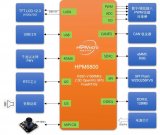

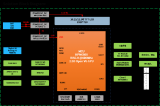










評論